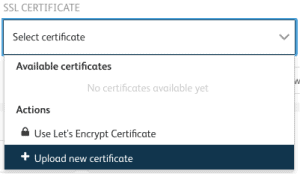The Machine Room
In the “News from the machine room” article series, we regularly post content detailing exciting new products and relevant updates to our wide range of offerings. Would you like to try out for yourself what we write about here? Simply create a free account.
General Availability Releases
We’re chuffed to announce that Microsoft SQL Server and Rocket Storage have been released out of the Labs phase into general availability! Along with this change comes the stability and assurance of our SLA’s. Microsoft SQL Server is a managed SQL database and can be found under gridSQL, and Rocket Storage is our blazingly fast NVMe based local storage offering featuring high I/O performance and ultra-low latency.
Panels
We’ve refreshed and streamlined the panel login page, making the registration process a breeze for new users – this signup process will eventually also be brought in for Partners, once self-signup is supported. We’ve updated the 5xx error pages and improved deliverability when services are down.
Within the Partner Panel, we’ve improved the way Feature Flags are handled, particularly in cases such as GSK which rely on other features like IPs wherein disabling a required feature will now disable the parent feature.
In addition to these, we’re constantly striving to make several improvements and corrections across the board to enhance your user experience.
GSK – Managed Kubernetes
We’ve released minor version upgrades to our Managed Kubernetes offering, allowing you to upgrade your clusters across multiple versions (1.16, 1.17, 1.18 and 1.19). We’ve also improved admin kubeconfig timeouts.
System and container logs are stored by worker nodes within journald, which are then additionally forwarded to /var/log/syslog. This additional step in the logging process takes up unnecessary space, and so we’re planning to start deprecating logging from journald to syslog from 12.04.2021. This will then be made available from the latest patch version thereafter.
PaaS
This month also featured some updates to our managed service offerings. We’ve enabled query caching as a default option within our Managed Database MySQL and MariaDB services. We’ve extended support for MariaDB versions 10.4 and 10.5, along with updates for version 10.3.
Object Storage
Our S3-based Object Storage offering now supports cross-origin resource sharing (CORS). We’ve also extended access control headers support within the gos3.io S3 endpoint, keeping in line with the new AWS SDK release. We’re also currently working on documenting the features supported by our Object Storage, coming your way soon!
Partner E-Mail Functionality
As a Whitelabel Partner, you now have the possibility to configure an SMTP server for your users, which you can find within the Partner Panel under Settings → SMTP. You can either select an existing provider from the list, or configure your own SMTP server access credentials as well. Activating SMTP for your Tenants automatically enables the Magic Link feature, and partners will receive this functionality shortly too. In the near future we’re also planning on automating self-signup, making the signup process a breeze.
Load Balancer
Our Load Balancers now allow you to add your own SSL certificates which you can do by navigating to the Load Balancer Expert Panel. Add a new HTTP forwarding rule to your Load Balancer and navigate to “Upload new certificate” under the SSL Certificates section, as shown in the image below.

A dialog box will then prompt you to enter your custom certificate details, namely the certificate name, PEM private key and public SSL, and the SSL certificate chain. Click the save button and you’re good to go! Keep reading on if you wish to know how you can perform the same using our API.
API
This month saw a new release of our Contract Management API, with the addition of a new endpoint to list out contract price lists, and featuring improvements to the way price lists are handled. Mandatory fields that are required while creating an account include the contract name as well as the first and last names that are associated with the account.
You can also configure Load Balancers to use your SSL certificates, which you can manage using the certificates endpoint. Once you’ve uploaded them, you can add the certificate within the Load Balancer forwarding rules.
We’ve added Rocket Storage limits within the resource limits endpoint and moved autoscaling information into the PaaS service template API, making scaling parameters easily programmable.
We’ve also made several improvements to the Partner API. You can refer to the Partner API Documentation for more details.
ISO Images
We’ve updated the ArchLinux image supporting the latest version (2021.03.01).
Github Ecosystem
During the course of the previous month gridscale’s in-house tools and libraries, intended to optimize and simplify workflows, underwent several updates.
We’ve released an update to the command line interface for the gridscale API, gscloud, to v0.9.0. New features include the commands to create networks, improved server deletion and server event handling, and documentation extensions. We’ve also added support for Apple M1 builds and automatic password generation for servers. The gscloud package for FreeBSD also supports this latest version.
Our Go-based gridscale API client, gsclient-go, has been updated to v3.5.0. The client facilitates an application to interact with the gridscale Cloud Platform and allows you to create and manage resources. This release allows you to take advantage of both storage types – either Distributed or Rocket Storage. Improvements as part of this release include tracing individual client call durations as well as performance and documentation improvements.
We’ve also updated our Node.js API client, gsclient-js also saw an update this month to v1.1.0. This release features the addition of a new certificate object class allowing you to perform certificate management, and an update to the Load Balancer object class with new certificate information.
gridscale’s Terraform Provider has also been updated to v1.8.4. If you’re interested in exploring some examples you can visit this link. Updates from this month include support for our latest Go-based API client along with Go runtime improvements and support for macOS arm64.
More from the Machine Room
Machine Room June 2023
Even though it’s getting warmer outside, we’re still working hard to make your gridscale experience…
